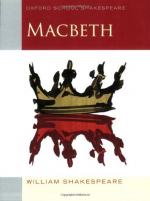|
This section contains 3,260 words (approx. 11 pages at 300 words per page) |

|
SOURCE: Kałuża, Irena. Introduction to The Language of Deception in Macbeth: A Study in Equivocation and Hidden Meaning, pp. 9-16. Kroków: Nakladem Uniwersytetu Jagiellonkiego, 1990.
In the following essay, Kałuża summarizes pervasive patterns of hypocrisy, deception, and equivocation in Macbeth.
Macbeth is a tragedy with a criminal as tragic hero. For such a tragedy to achieve the right tragic effect, the evil must be balanced by other elements. In Macbeth some of the balancing factors are to be found in the very quality of the language of the play. Thus in Acts I and II Macbeth's evil-doing is contrasted with his anguished introspective language, and later, when he becomes a hardened criminal, the horror of his crimes is, paradoxically, both accentuated and alleviated by the magnificence of his language. It is this ‘language of compensation’ that is generally thought of as the ‘language of...
|
This section contains 3,260 words (approx. 11 pages at 300 words per page) |

|


